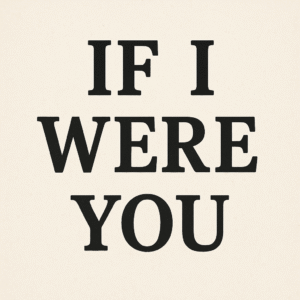If I was you OR If I were you-GPS-22
If I was you OR If I were you OR Should We Say “If I Was You” or “If I Were You”?- Grammar Puzzle Solved (22)
One of the most common grammar confusions in English is whether to say “if I was you” or “if I were you.” Both sound familiar, especially in casual conversation, but one is grammatically correct while the other is not—at least in formal English.
The Subjunctive Mood Explained
To understand the correct form, we need to look at something called the subjunctive mood. In English, the subjunctive is used to talk about hypothetical, unreal, or contrary-to-fact situations.
For example:
-
If I were taller, I’d join the basketball team.
-
If she were here, she’d explain everything.
Notice that even though we’re talking about “I”, which normally goes with “was” in the past tense, we use “were” instead. This is a special feature of the subjunctive mood.
Why “If I Were You” Is Correct
So when we say:
-
If I were you, I’d apologize,
we’re imagining a situation that isn’t real—we’re not actually the other person. Therefore, the correct form is “If I were you.”
Using “If I was you” is grammatically incorrect in formal writing because it ignores the subjunctive mood. However, it’s very common in casual speech.
Informal Usage
In everyday conversation, many native speakers say “if I was you” without realizing it breaks the traditional rule. While it’s widely understood and often accepted in informal speech, it’s still better to use “if I were you” in writing and formal situations.
Final Verdict
To solve the puzzle, remember: use “were” for unreal or imagined situations. It’s the grammatically correct form, especially in writing.

E.M. Forster as a Modernist Writer:
https://englishlitnotes.com/2025/06/01/em-forster-as-a-modernist-writer/
Mark Twain: https://americanlit.englishlitnotes.com/mark-twain/
Sir Alexander Fleming by Patrick Pringle: https://englishwithnaeemullahbutt.com/2025/06/02/alexander-fleming/
Use of along with:
https://grammarpuzzlesolved.englishlitnotes.com/the-book-along-with-the-notebooks/
For grammar lessons, visit ChatGPT to explore the platform and interact with the AI: https://chat.openai.com
Discover more from Grammar Puzzle Solved by Naeem Ullah Butt
Subscribe to get the latest posts sent to your email.
